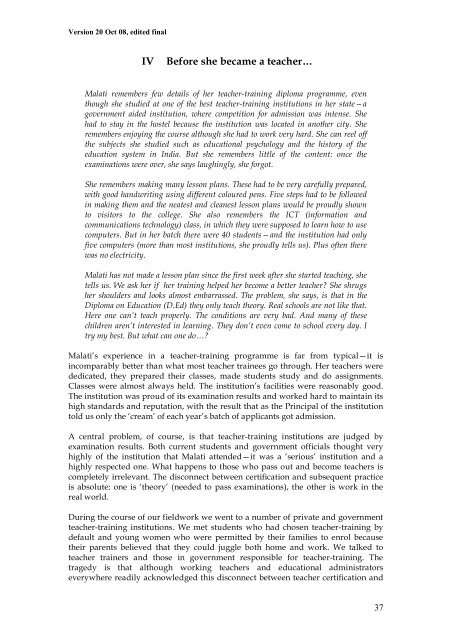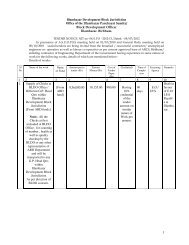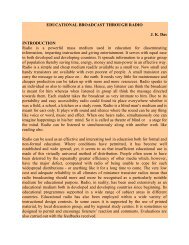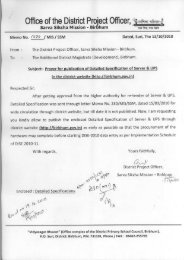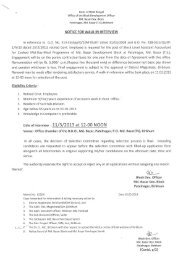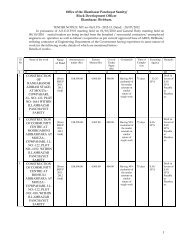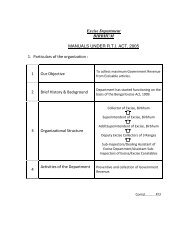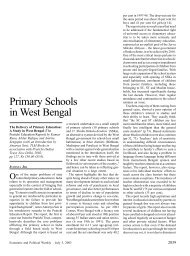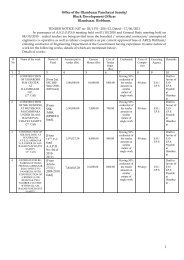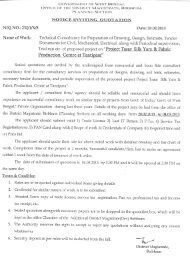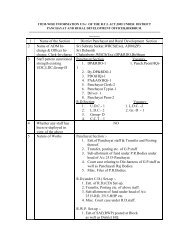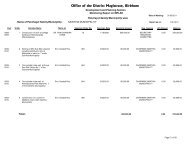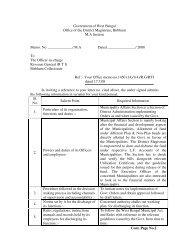primary school teachers the twists and turns of ... - ERU Consultants
primary school teachers the twists and turns of ... - ERU Consultants
primary school teachers the twists and turns of ... - ERU Consultants
Create successful ePaper yourself
Turn your PDF publications into a flip-book with our unique Google optimized e-Paper software.
Version 20 Oct 08, edited finalIVBefore she became a teacher…Malati remembers few details <strong>of</strong> her teacher-training diploma programme, eventhough she studied at one <strong>of</strong> <strong>the</strong> best teacher-training institutions in her state—agovernment aided institution, where competition for admission was intense. Shehad to stay in <strong>the</strong> hostel because <strong>the</strong> institution was located in ano<strong>the</strong>r city. Sheremembers enjoying <strong>the</strong> course although she had to work very hard. She can reel <strong>of</strong>f<strong>the</strong> subjects she studied such as educational psychology <strong>and</strong> <strong>the</strong> history <strong>of</strong> <strong>the</strong>education system in India. But she remembers little <strong>of</strong> <strong>the</strong> content: once <strong>the</strong>examinations were over, she says laughingly, she forgot.She remembers making many lesson plans. These had to be very carefully prepared,with good h<strong>and</strong>writing using different coloured pens. Five steps had to be followedin making <strong>the</strong>m <strong>and</strong> <strong>the</strong> neatest <strong>and</strong> cleanest lesson plans would be proudly shownto visitors to <strong>the</strong> college. She also remembers <strong>the</strong> ICT (information <strong>and</strong>communications technology) class, in which <strong>the</strong>y were supposed to learn how to usecomputers. But in her batch <strong>the</strong>re were 40 students—<strong>and</strong> <strong>the</strong> institution had onlyfive computers (more than most institutions, she proudly tells us). Plus <strong>of</strong>ten <strong>the</strong>rewas no electricity.Malati has not made a lesson plan since <strong>the</strong> first week after she started teaching, shetells us. We ask her if her training helped her become a better teacher? She shrugsher shoulders <strong>and</strong> looks almost embarrassed. The problem, she says, is that in <strong>the</strong>Diploma on Education (D.Ed) <strong>the</strong>y only teach <strong>the</strong>ory. Real <strong>school</strong>s are not like that.Here one can’t teach properly. The conditions are very bad. And many <strong>of</strong> <strong>the</strong>sechildren aren’t interested in learning. They don’t even come to <strong>school</strong> every day. Itry my best. But what can one do…?Malati’s experience in a teacher-training programme is far from typical—it isincomparably better than what most teacher trainees go through. Her <strong>teachers</strong> werededicated, <strong>the</strong>y prepared <strong>the</strong>ir classes, made students study <strong>and</strong> do assignments.Classes were almost always held. The institution’s facilities were reasonably good.The institution was proud <strong>of</strong> its examination results <strong>and</strong> worked hard to maintain itshigh st<strong>and</strong>ards <strong>and</strong> reputation, with <strong>the</strong> result that as <strong>the</strong> Principal <strong>of</strong> <strong>the</strong> institutiontold us only <strong>the</strong> ‘cream’ <strong>of</strong> each year’s batch <strong>of</strong> applicants got admission.A central problem, <strong>of</strong> course, is that teacher-training institutions are judged byexamination results. Both current students <strong>and</strong> government <strong>of</strong>ficials thought veryhighly <strong>of</strong> <strong>the</strong> institution that Malati attended—it was a ‘serious’ institution <strong>and</strong> ahighly respected one. What happens to those who pass out <strong>and</strong> become <strong>teachers</strong> iscompletely irrelevant. The disconnect between certification <strong>and</strong> subsequent practiceis absolute: one is ‘<strong>the</strong>ory’ (needed to pass examinations), <strong>the</strong> o<strong>the</strong>r is work in <strong>the</strong>real world.During <strong>the</strong> course <strong>of</strong> our fieldwork we went to a number <strong>of</strong> private <strong>and</strong> governmentteacher-training institutions. We met students who had chosen teacher-training bydefault <strong>and</strong> young women who were permitted by <strong>the</strong>ir families to enrol because<strong>the</strong>ir parents believed that <strong>the</strong>y could juggle both home <strong>and</strong> work. We talked toteacher trainers <strong>and</strong> those in government responsible for teacher-training. Thetragedy is that although working <strong>teachers</strong> <strong>and</strong> educational administratorseverywhere readily acknowledged this disconnect between teacher certification <strong>and</strong>37


